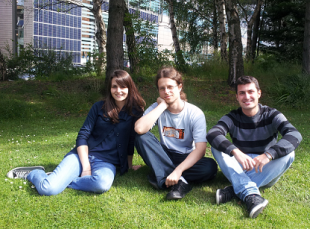Manon Foulc: I am a French student from Avignon, studying in Toulouse at the INP-ENSIACET (Polytechnic National Institute – Chemical and Technology Engineering School) and I am expecting to graduate with a MEng in Materials Engineering in 2013. During my placement, I updated the database of isotherms of chosen gases from collected articles. Besides isotherms, I also included descriptions of experiments, adsorbents, calculations of heats of adsorption, and model equations in the database. My school gives its students the opportunity to do a three-month internship abroad. I really enjoyed this experience because I was able to improve my English skills and scientific knowledge. I also discovered more about the research world and working within a group. I enjoyed the city of Edinburgh a lot and being able to learn about a new culture.
Artur Wozniak: I am studying materials engineering at the Mechanical Faculty of the Technical University of Lodz, Poland. Through the IAESTE (International Association for the Exchange of Students for Technical Experience) program, I secured an eight-week placement with the carbon capture group at the School of Engineering. My first task was to learn how to operate the laboratory equipment (Autosorb, poremaster and ZLC system). I then tested polymeric resins (made by Purolite) for their capacity to adsorb CO2 using the ZLC system. I also researched literature data in order to compare it with the data I obtained from my tests. I enjoyed working here very much - the atmosphere at work is very friendly and my co-workers are very helpful. I feel like I have been able to broaden my horizons thanks to this internship. Also Edinburgh is a beautiful city, which I enjoyed very much exploring.
Claudio Calabrese: I am an Italian student from Sicily, and I have been living and studying in Palermo for the past five years. I am currently in the final year of my Master’s Degree in chemical engineering. During my six-month visit to the University of Edinburgh, I will be testing the gas permeation of pure gases, such as CO2and N2, using the membrane permeation cell. A single gas can be tested using the fixed-volume, variable-pressure method. This system measures permeate flux by monitoring the pressure increase of collected gas in a closed volume and utilising a pressure transducer in the downstream volume. The membrane materials I am investigating are polymers, such as PIM (PIM-1, PIM-PI1), PSF (PSF or PSF + different % SiO2), PVDF (PVDF or PVDF + different % SiO2). I think that this experience of living abroad will help me grow as a person and as a student. I hope to improve my English language skills and to gain practical experience from my training. Edinburgh is amazing, so I hope to enjoy myself here too.


